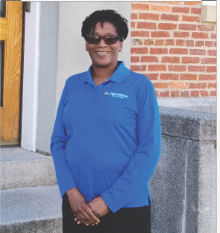 Nancy is the first to say that she never really had a childhood.
Nancy is the first to say that she never really had a childhood.
As young as she can remember, she was the main person responsible for her family of seven despite being the middle sibling. When she wasn’t working to provide for them financially, she was acting as the head of household for other families. Even the leisure time and the few toys she had were shared with her siblings. While it was fulfilling to support her family, Nancy had no time to take care of herself.
As an adult, the endless flow of working to support others continued. One day she just couldn’t keep up, and Nancy “took a fall”— she could no longer afford rent. Facing homelessness and realizing her own limitations, she turned to drinking and drugs, quickly becoming “broken in all areas of life.”
Nancy’s first step to stopping her downward spiral was attending recovery meetings, where she first learned of Marian House. She was self-conscious about joining a transitional program in her early fifties, but the lack of an age limit encouraged her. When she was admitted as a resident, she saw immediate improvement, fueled by Marian House’s resources. “Everything I expected to be there, it was more,” she says now.
When she arrived, Nancy learned how to accomplish and enjoy tasks for herself that she had only done for others before. She learned how to properly get a job, manage her own finances, and dress appropriately for the workplace. The support and community Nancy received helped her gain the mental and physical strength to obtain independence. When she had a bout of illness early in her stay, “Marian House was there for me.” Group dinners in the Great Room made Nancy feel like she was, for the first time, in a community where people would do nice things for her and not expect anything back from her in return.
Nancy views Marian House as a place where, even with all the pressure from the outside world to take care of others, she could “get to know myself first.” Through therapy and Marian House’s emphasis on developing strong relationships, she went from a person who “couldn’t speak or hold conversations with others” to a strong self-advocate. She knew Marian House had rejuvenated her when, for the first time since she lost her home, she started baking cookies again. The skills for self-sufficiency Nancy learned in transitional housing made her secure in her finances, confident in her abilities, and proud of herself.
Nancy says, “Sometimes we think we need things at a certain point, but they come when the time is right.” After nearly a whole life spent taking care of others at her own neglect, Nancy can finally take care of herself. Marian House helped Nancy regain her independence. As she ends her time in transitional housing and begins the move to an independent apartment close to her job at Johns Hopkins Hospital, Nancy still feels that her recovery isn’t over—she’s just happy to feel her true self, and her inner child, blossom.